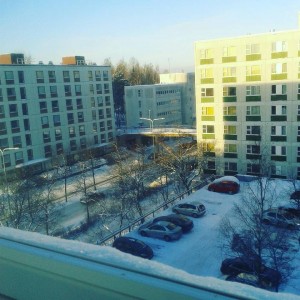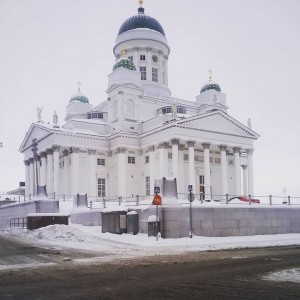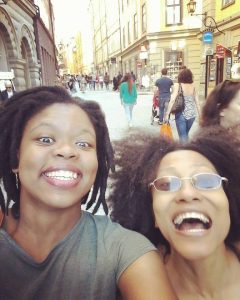Updated: 15 June 2016
Pre-departure:
I can’t believe this day has finally come! It actually feels surreal, like an out-of-body experience and like I’m living someone else’s life. The steps leading up to this moment seemed almost impossible to take throughout the application: from filling out the application form; to preparing the video; to compiling motivation letters; to applying to the host institution; and all the way to applying for and receiving my visa. There were times when I felt like I had to give my all because I had nothing to lose, but there were also times when I felt like letting the idea go. I had nothing to lose, right? The idea was too big and the academic pressures of being a final-year student working part-time were starting to get to me. The International Office, especially Sarah, was really helpful and supportive throughout the entire process and that made things a lot easier to deal with.
In terms of the application, the video idea answering a question worked extremely well. It allowed for time to thoroughly think of our answers, as opposed to an interview in person. I, and probably many others, do not like being under pressure, so answering questions in video-form was very helpful. What also worked well was the constant contact between the coordinators of the host and home institutions with me. I was never left out in terms of decision making and relayed information. Staying ‘in the loop’ helped me keep calm about everything, even though I’m sure Sarah may slightly disagree on this one. What also worked well – in the long run – was letting us book our own tickets and apply for our own visas. In the beginning I found it stressful as prices were just going up and making a sound decision was hard, as I’ve never done that before. In the long run, I appreciated that experience as it taught me a lot about budgeting a large sum of money on my own and being responsible for my own affairs. What is also nice is that the staff at the International Office really tries its best to attend to our individual needs as students. Sometimes I feel that they really do go the extra mile and I don’t know how they cope with so many outgoing and incoming students at the same time and still manage to adhere to everyone’s requests. I really appreciated that.
One thing that could use some improvement, especially with students outgoing in the first semester, is the registration process. It was almost impossible to get registered as I couldn’t register online for no apparent reason, so I think a plan should be made about that. I also think that a detailed outline on how the fee-payments work at SU when on an exchange semester should be made available for students and their parents, especially in terms of registration for university accommodation. Apart from that, everything else went smoothly and everything, in my opinion, was well-thought out and well-planned.
Throughout the application, if anything, I’ve learnt to be patient – something I’ve never particularly been good at. I’m looking forward to the upcoming semester and as nervous as I am, I’m sure everything will work out – it always does.
At Helsinki:
I’ve been in Helsinki for almost a month now and I have settled in quite well. The first few days were really busy and I didn’t do much except for trying to sort out admin and sleep because it was so tiring. The biggest adjustment I’ve had to make more than anything else is getting used to the extremely cold weather conditions, but I’m managing.
During the first few days I attended the Orientation Week and met a few other international students in the Arts Faculty. I was surprised to find that I was the only one from South Africa and one of three from Africa (including the other faculties). My first group of friends consisted of the students I met at Orientation Week, but expanding to new circles proved to be hard, since the Welcome Programme here isn’t structured like the one we have at Stellenbosch. This made it especially hard to make friends with local students. The Finns, based on my observations, are very reserved people, to say the least. But once the ice is broken, they’re very kind and genuine. My first local friend was my tutor, Tiia. She has been beyond helpful and I must say, the tutors or “buddies” (as we call them) really go the extra mile to ensure that we have everything we need at all times. One thing that has also helped in my quest to making local friends was the friendships I have formed with past exchange students at Stellenbosch. Last year I mentioned to a friend that I would be coming here and that I didn’t know anyone and she put me in contact with a few of her friends from Helsinki. At first I didn’t want to be intrusive and make contact, but as classes started and as the other exchange students formed new ties, the loneliness started kicking in. There was a time when I felt very alone and very misplaced. But I couldn’t let that carry on for too long as I was afraid I’d dig myself into a hole that I wouldn’t be able to get out of, so I reached out… I’m glad to say that now I feel much better and that I am back on track: going to class; going out and meeting new people; exploring… it feels good to be back!

Classes started on the 18th of January and I was actually very excited to start the new year! I’m taking four courses: Bantu Languages, Research Methods, Fieldwork Preparation as well as Clinical Neurolinguistics – which is my favourite! The courses are all structured differently but they have one thing in common: we barely have any class time and we are expected to be self-sufficient – unlike in Stellenbosch. This is something I’m not quite used to and I don’t really k now how to feel about it. The lecturers here are very trusting in terms of letting us take agency when it comes to our studies and they are also very supportive so when we derail, they are always willing to assist us.
However, the first day of classes was not a very pleasant one. I was in the Bantu Languages lecture which was supposedly available to international students, according to the course catalogue as well as the lecturer – I had spoken to her about taking the course last year shortly after submitting my application. It was a two hour lecture and about 45 minutes of the lecture was in Finnish. Finally I decided to stick my hand up in case the lecturer hadn’t noticed me. After class I asked if it was possible to have the slides in English so that I could properly catch up on the lecture and surprisingly, the reply was, “No. I can’t only translate for just one person”. The trip back home was long and tedious because all I wanted to do was cry. I felt stupid, to say the least. I kept replaying sitting there in that classroom wondering what the other students thought as I sat there trying to make sense of what was merely a string of sounds. I wondered if this is how the students facing language difficulties with Afrikaans at Stellenbosch felt like every single day. Frustration, that is the only thing that resonates when I think of that day. A few days later I was asked to stop attending lectures and to take a book exam since it would be “too much work” to translate everything for “one person”. I felt like I was thrown in the deep end because I could have been made aware of this in mine and the lecturer’s previous interactions. I felt (and still feel) that it was really ironic for a Bantu speaker to be excluded from a course (supposedly available to everyone) on Bantu languages on the basis of not being a Finnish speaker. I felt like my time was wasted because if I had known, I would have opted for something else. I never thought that an internationally renowned university would (passively) discriminate against international students wishing to take part in its learning experience. However, I’ve decided to go on with the course and not let this affect the rest of my study period here.

Other than this incident, the other courses have been exciting and have given me a lot to think about in terms of my future plans. I may consider coming back here as a full time student since they have MA programmes I am extremely excited about.
I am also sure that the rest of my stay will be a great experience as I continue to make more friends and explore Helsinki and the areas surrounding it.
Return to Stellenbosch:
I’ve been back in South Africa for just over a week now and it’s DEFINITELY good to be back! It feels great to be on familiar ground again. The past few months have been a constant struggle of trying to find a balance between my outgoing and extroverted South African self and the quiet and introverted Finnish culture. The extra time I had to myself gave me a chance to do a lot of introspection and reflection on the semester as a whole. I’ve always wanted to move to a new place, start over and learn and live in a cultural and social context I’m not used to. I’ve always thought it would be easy, but it was, without a doubt, extremely challenging and one of the hardest things I’ve ever had to do. It turns out I took the small life pleasures in South Africa for granted. Upon my reflection, I found that I embraced South African culture and way of life that much more. I missed simple things like taking a taxi to Cape Town; having a chip chow for supper because #studentbudget; spontaneous klein Saterdag evenings with my res mates at Bohemia… the list is endless. But through it all, living in Helsinki has taught me to appreciate my own company and not always rely on others to have fun – so to speak. I’ve learnt to be self-sufficient and that I don’t have to be afraid to try doing things on my own.

I also used the time to do some travelling. Seeing my sister and one of my best friends during my visit to Germany and my past Stellenbosch lecturer during my visit to Sweden was a breath of fresh air. As cliché as that may sound, it’s true. It was comforting seeing familiar faces and knowing that I wasn’t alone in feeling overwhelmed by new surroundings. I also managed to see my TSAP host family once again. After leaving Tuebingen last year, I never thought it would be possible to see them again, but thankfully it was and I have a feeling I’ll be back in Tuebingen again in no time.
Though the semester as a whole was challenging and emotionally taxing, to be very honest, the last few weeks in Helsinki were quite pleasant. The weather was starting to change and the days were getting longer and longer. Experiencing days where the sun didn’t set was extremely bizarre. I couldn’t stop telling my family about it. Every day I was shocked all over again!!! And surprisingly, the Finnish locals also started coming out of their shells. I also started going out more than usual and found that I was more at ease with my daily routine.
Being back in SA, I expected a major reverse culture shock. My expectations were met. In terms of most things, like safety, education and access to basic services like public transport, for example, South Africa and Finland are polar opposites and before leaving I knew South Africa had a lot of catching up to do, but I was never aware of the extent to which we needed to catch up. But anyway, even though we have our faults, there is a lot we also have to offer the world. For example, with Europeans being individualistic, our strong sense of community, interdependence and collectivism as South Africans makes us aware that we live in a world with other people and it makes us warm, compassionate and empathetic – those are prevalent South African traits I’d choose any day. Meeting a Xhosa woman at the Helsinki train station and instantly becoming umkhaya (a term which can be interpreted as “distant relative”) to her and her to me just proves the warm-hearted nature we have as South Africans and if anything, the world really needs that.
Going into the exchange, my list of expectations was far more limited than my actual experience. I had a restricted understanding of terms like interdependence and individualism (in a cultural context), for example, but living in Helsinki and experiencing a social context which was completely opposite to the one I was accustomed to completely changed my view for the better. I’m already thinking of more opportunities to go back abroad. This time, I’m considering somewhere closer to home… somewhere in Africa as a summer school student. Life in Europe and in South Africa has made me curious about what else Africa has to offer.
I’m grateful for the opportunity I was given by the General Linguistics Department, the PGIO International Office and the Nylund Foundation. I’d like to especially thank the PGIO staff for always managing to keep me calm and for always reminding me that as long as I’m calm, things will always work out as they should ☺, and they did!

